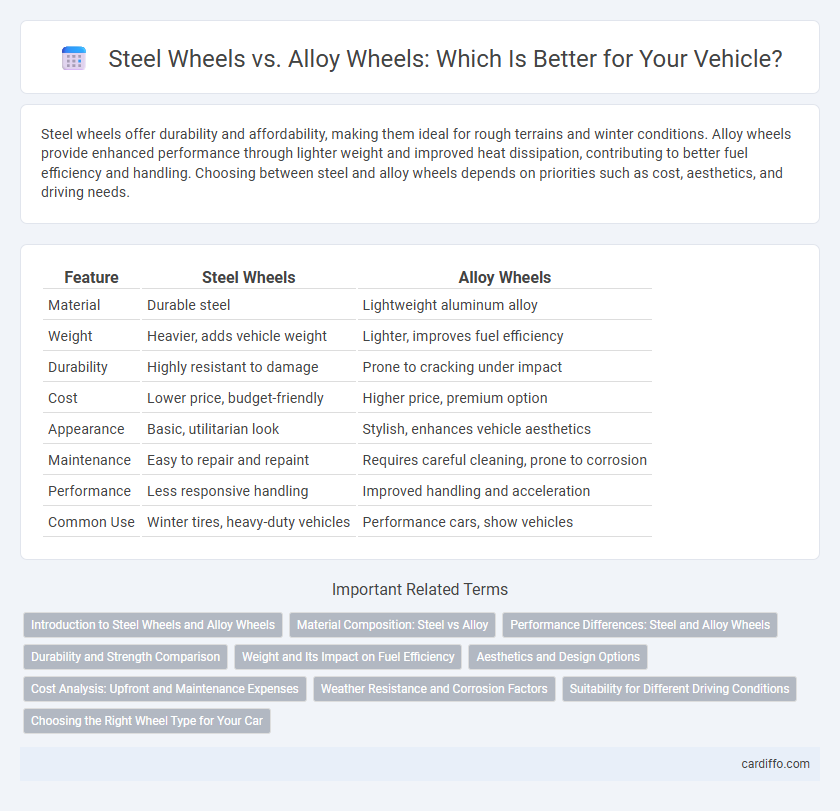Steel wheels offer durability and affordability, making them ideal for rough terrains and winter conditions. Alloy wheels provide enhanced performance through lighter weight and improved heat dissipation, contributing to better fuel efficiency and handling. Choosing between steel and alloy wheels depends on priorities such as cost, aesthetics, and driving needs.
Table of Comparison
| Feature | Steel Wheels | Alloy Wheels |
|---|---|---|
| Material | Durable steel | Lightweight aluminum alloy |
| Weight | Heavier, adds vehicle weight | Lighter, improves fuel efficiency |
| Durability | Highly resistant to damage | Prone to cracking under impact |
| Cost | Lower price, budget-friendly | Higher price, premium option |
| Appearance | Basic, utilitarian look | Stylish, enhances vehicle aesthetics |
| Maintenance | Easy to repair and repaint | Requires careful cleaning, prone to corrosion |
| Performance | Less responsive handling | Improved handling and acceleration |
| Common Use | Winter tires, heavy-duty vehicles | Performance cars, show vehicles |
Introduction to Steel Wheels and Alloy Wheels
Steel wheels are known for their durability and affordability, commonly found on entry-level vehicles and trucks due to their robust construction and resistance to damage. Alloy wheels, made from a blend of aluminum and other metals, offer lighter weight, improved heat dissipation, and enhanced aesthetic appeal, often preferred for performance and luxury vehicles. Choosing between steel and alloy wheels depends on factors such as budget, vehicle type, and driving conditions, balancing strength with style and performance.
Material Composition: Steel vs Alloy
Steel wheels are made from pressed steel, offering durability and resistance to impact at a lower cost, but they tend to be heavier, affecting fuel efficiency and handling. Alloy wheels are composed primarily of aluminum or magnesium alloys, providing a lighter weight that enhances vehicle performance and fuel economy while allowing for more intricate designs. The material composition of alloy wheels also offers better heat dissipation, reducing brake wear compared to steel wheels.
Performance Differences: Steel and Alloy Wheels
Steel wheels provide greater durability and resistance to impacts, making them ideal for rough terrains and heavy-duty use. Alloy wheels offer improved performance with lighter weight, enhancing acceleration, braking, and fuel efficiency due to reduced unsprung mass. The choice between steel and alloy wheels significantly affects vehicle handling, ride comfort, and overall driving dynamics.
Durability and Strength Comparison
Steel wheels offer superior durability and strength due to their solid construction, making them less prone to cracking or bending under heavy loads or rough terrain. Alloy wheels, while lighter and providing better heat dissipation, tend to be more susceptible to fractures and physical damage from impact. For demanding conditions requiring maximum toughness, steel wheels remain the preferred choice for long-lasting performance.
Weight and Its Impact on Fuel Efficiency
Steel wheels typically weigh more than alloy wheels, increasing the overall vehicle weight and negatively affecting fuel efficiency. Lighter alloy wheels reduce unsprung mass, enhancing fuel economy and improving acceleration and braking performance. Choosing alloys can lead to noticeable savings in fuel consumption over time due to reduced rolling resistance.
Aesthetics and Design Options
Steel wheels offer a traditional, utilitarian look with limited design variations, typically featuring a solid, robust appearance ideal for durability. Alloy wheels provide a wider range of aesthetic choices, including intricate spoke patterns and custom finishes that enhance vehicle style and visual appeal. The lightweight nature of alloy wheels also allows for more innovative and aerodynamic designs compared to steel wheels.
Cost Analysis: Upfront and Maintenance Expenses
Steel wheels generally have a lower upfront cost, making them a budget-friendly option for cost-conscious buyers. Alloy wheels tend to be more expensive initially but offer better durability and resistance to corrosion, potentially reducing long-term maintenance expenses. Evaluating the total cost of ownership, including repair and replacement frequency, is essential when choosing between steel and alloy wheels.
Weather Resistance and Corrosion Factors
Steel wheels demonstrate superior durability in harsh weather conditions due to their robust composition, effectively resisting dents and impacts from debris. Alloy wheels, while lighter and offering better heat dissipation, are more prone to corrosion, especially when exposed to road salt, moisture, and acidic conditions common in winter climates. Protective coatings and regular maintenance significantly enhance the weather resistance of alloy wheels, but steel remains the preferred choice in environments with frequent exposure to corrosive elements.
Suitability for Different Driving Conditions
Steel wheels offer enhanced durability and are ideal for rugged terrains, heavy-duty use, and winter driving due to their resistance to impact and corrosion. Alloy wheels provide better performance in dry conditions, offering improved handling, lighter weight for fuel efficiency, and superior heat dissipation under high-speed driving. Choosing between steel and alloy wheels depends on driving habits, with steel favored for rough, off-road environments and alloys for smoother, urban, and performance-focused routes.
Choosing the Right Wheel Type for Your Car
Steel wheels offer durability and cost-effectiveness, making them ideal for harsh driving conditions and winter use, while alloy wheels enhance vehicle performance through lighter weight and improved heat dissipation. Choosing the right wheel type depends on factors such as driving style, budget, and desired aesthetics, with steel wheels suiting budget-conscious drivers and alloy wheels preferred for enhanced handling and appearance. Proper wheel selection optimizes safety, fuel efficiency, and overall driving experience tailored to individual car needs.
Steel wheels vs Alloy wheels Infographic

 cardiffo.com
cardiffo.com